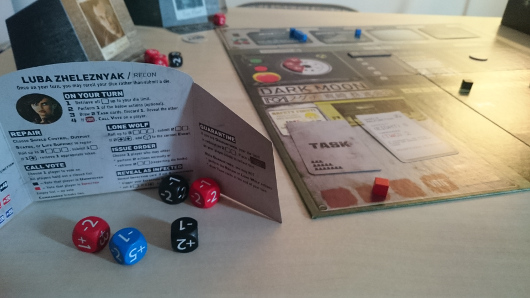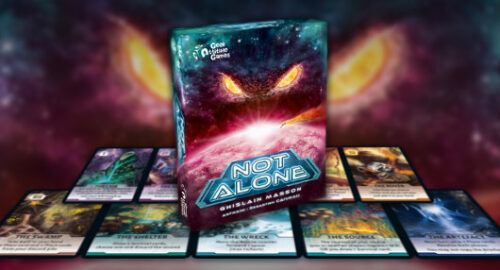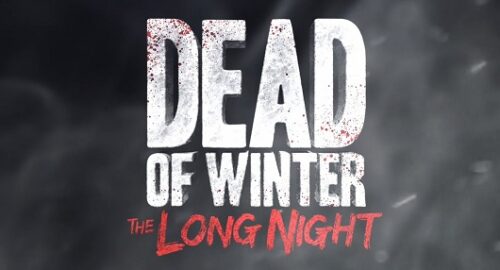Ok…stop…breathe. You’re not one of them; I’ve run the blood test, you’re clear, so I know it’s not you who sabotaged the station. I know I can trust you…
Dark Moon is a hidden traitor game, you play as a character trapped on a space station that is coming apart around you, whilst some of the group are trying to make the station fall to pieces even faster.
• Designer: Evan Derrick
• Publisher: Stronghold Games
• Number of Players: 3-7
• Playing Time: 60-75 minutes
It all started when Matthews and Kilroy came back with something inside them after that last dig – something that got inside their suits and took over their bodies.
Some of the players have been infected by some sort of (unspecified) alien parasite and win if they manage to destroy the space station.
Since then everything has been going wrong with the station. The shields are failing, and if they go the station is going to melt. The station systems keep malfunctioning, and the quick patches aren’t holding it, soon the station is going to be blind and powerless. And then the life support is going – it’s not going to take long before the air goes bad and we drift off to sleep never to wake up. Now that I think about it that last option doesn’t sound so bad…we’ll never last long enough to get off this station…
If any of the three core systems of the station fail everyone dies. This is obviously bad news for the uninfected humans. But if they can keep the station in one piece long enough to complete four events they survive (and win).
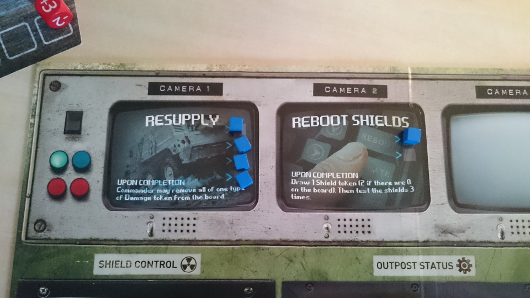
All I know is that there must be more of them out there. Matthews and Kilroy couldn’t have caused all this damage alone. But they still look human, so how can we trust anybody!?
On your turn you choose a single task to attempt, such as patching up the failing shields or fixing a broken system. You then roll your dice, with four negative sides and two positive sides, in secret and then choose one to spend on the task. If it is positive the action succeeds and you fix the station or prevent the malfunction, but if the die is negative then attempt fails. With your starting hand of four dice you have a reasonable chance of rolling at least one positive result when you attempt a task. However it’s believable not to as well, giving the traitors that chance to hide their sabotage behind “poor luck”, and this gets worse as each player spends their dice leaving them with fewer and fewer in hand. This works really well at creating doubt and mistrust around your actions, but at the cost of reducing the control you have over your actions in the game.
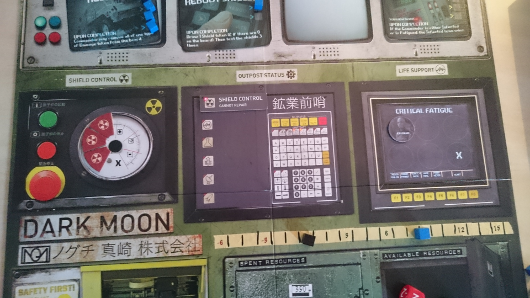
Last night we had a major malfunction in life support and just when it looked like we had solved it Jon managed to break the carbon dioxide scrubber. He always was clumsy but surely that’s more than just carelessness…right…
Malfunctions are the best part of Dark Moon. At the end of each players turn they draw two task cards that indicate malfunctions of varied seriousness and that player gets to choose, in secret, which what the team will need to solve. This provides more opportunity for mistrust; “did they really choose the better option?” But this part of the game is resolved in a really smart way. Before rolling any dice players commit to helping with the malfunction or sitting out, and only then do you roll and spend dice on the malfunction. The interesting wrinkle is that every player who went in must contribute at least one die to the task so you could easily find yourself making things worse when the rest of the team had got the score high enough… or was that part of your plan all along!? Dark Moon creates plenty of opportunities to incriminate yourself!
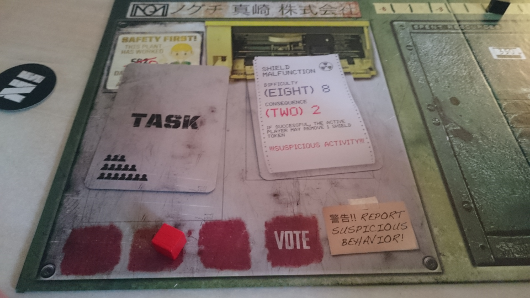
Either way we can’t risk it, we need to get him into quarantine.
With all this suspicious behaviour going around it is inevitable that you will lose faith in the other players at which point you can call for them to be quarantined, stopping that player from taking part in the tasks and containing the threat of their infection. The way quarantine worked felt quit smart, it stops the player from doing any of the active tasks, but still lets them call for votes or give other players orders, just as if they were shouting through the bars of their cell. But at the same time quarantine felt too tame, as though it didn’t give players enough power to stop the saboteurs.
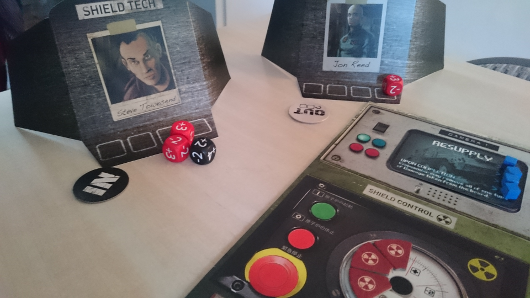
Jon’s shouting is driving me crazy. We put him in quarantine because we didn’t trust him, but he still seems to think we’ll listen to his advice! So much for “in space no one can hear you scream”
Dark Moon succeeds at giving you cause to suspect each and every one of the other players very quickly, kick-starting the game, and letting you get to the fun part of hidden traitor games sooner. However by tying your success to a dice roll stacked against you it often feels like you have little control or agency in the process. Compounding this is the fact that the choice of which action to take on your turn often feels incredibly obvious (fix the station with the most damage in most cases) so you aren’t really making a choice there either. To get the most out of it I felt like I needed to create a lot of the tension myself. I spent a lot of time accusing the other players, whenever they did anything even remotely suspicious, to make it feel like the choices we were making mattered.
It’s all hopeless, we’re staying one step ahead of the equipment failures but we’re never going to get the hell out of here either… [END LOG]
Dark Moon is a game I enjoyed a lot whilst playing it, but I feel less excited about it now. Overall I think it is a solid game but I haven’t been planning another game of it. I think that is because it didn’t create many memorable moments, probably because you can’t really plot and scheme, because anything you intend to do might be ruined by the roll of the dice. I would certainly play it again but wouldn’t go out of my way for it. Worth a try if you get the chance.
